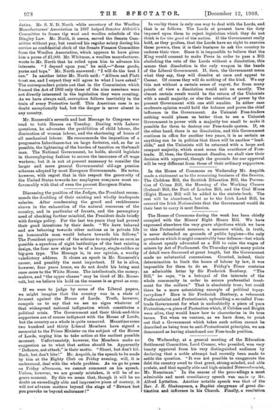If we were to judge by some of the Liberal
papers, we might imagine that the country was in a state of ferment against the House of Lords. Truth, however, compels us to say that we see no signs whatever of that widespread national indignation which constitutes a political crisis. The Government and their thick-and-thin supporters are of course indignant with the House of Lords, but the country as a whole is quite unmoved. Meantime some two hundred and thirty Liberal Members have signed a memorial to the Prime Minister on the subject of the House of Lords, urging him to take action at the earliest possible moment. Unfortunately, however, the Members make no suggestion as to what that action should be. Apparently "Defiance, not attack," is their motto. "Shout, but don't hit. Bark, but don't bite!" Mr. Asquith, in the speech to be made by him at the Eighty Club on Friday evening, will, it is understood, deal with the whole problem. As we go to press on Friday afternoon, we cannot comment on his speech. Unless, however, we are grossly mistaken, it will be of no grave moment. By this we mean that, though it will be no doubt an exceedingly able and impressive piece of oratory, it will not advance matters beyond the stage of "Beware lest you provoke us beyond endurance !" In reality there is only one way to deal with the Lords, and that is as follows. The Lords at present have the duty imposed upon them to reject legislation which they do not think is for the good of the nation. If the Government really hold, as they profess, that the Lords have no right to exercise those powers, then it is their business to ask the country to endorse their view. Since it is impossible to believe that the King would consent to make Peers in order to pass a Bill abolishing the veto of the Lords without a dissolution, this means that dissolution is the only weapon in the hands of the Liberal Government. If, then, the Government mean what they say, they will dissolve at once and appeal to Caesar. Of course they will do nothing of the kind. We say this not without a certain sense of regret, for from many points of view a dissolution would suit us exactly. The almost certain result would be the return of the Unionists with a small majority, or else the retention of power by the present Government with one still smaller. In either case moderate opinion would hold the balance and prove the chief influence in the Government. As Unionist Free-traders nothing would please us better than to see a Unionist. Government in power with a majority too small to make it possible for them to destroy our Free-trade system. If, on the other hand, there is no dissolution, and this Government continue in office for another two years, it is as certain as anything can be in politics that there will be another " land- slide," and the Unionists will be returned with a large and compact majority, which must mean the overthrow of Free- trade. If, then, the Government dissolve, we shall view their decision with approval, though the grounds for our approval will be very different from those of their ordinary supporters.






























































 Previous page
Previous page